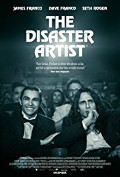
Directed by
James Franco
98 minutes
Rated M
Reviewed by
Bernard Hemingway

The Disaster Artist
Synopsis: The real life story behind The Room, a film by Tommy Wiseau (James Franco) that has become a cult favourite as "The Citizen Kane of Bad Movies"
I saw The Room when it was released in 2003 and was convinced that its sobriquet as “The Best Worst Movie Ever Made” was the tip of a considerable cinematic hoax. I couldn’t believe that anyone who had the nous to realize a feature film could make anything so completely wrong-headed without actually trying to do so. Writer/director’producer Wiseau himself might have been a talentless hack but what about the actors and the technicians? Surely not every one of them could be so comprehensively incompetent as the screen seemed to indicate. And how to explain the super-sized billboards that Wiseau used to promote the film in early days, Indie film just doesn’t work like this. This had to be a gigantic case of wool-pulling.
As it turns out and James Franco’s film persuasively demonstrates I was wrong, The factor that I hadn’t taken into account was that Wiseau was independently wealthy (perhaps as the result of an insurance payout) and sank some 6 million U.S. dollars into his film. With, as they say, “complete artistic control” and not just a matching lack of talent but possibly a sandwich or two short of a picnic Wiseau, genuinely it seems, outstripped Ed Wood in the Bad Movie stakes.
Ironically, Franco’s film about the making of The Room is at the other end of the artistic spectrum. Based on the book "The Disaster Artist: My Life Inside The Room, the Greatest Bad Movie Ever Made" Greg Sestero who was Wiseau’s only real supporter, it is, probably whether or not you have seen the original film, an essentially amusing portrayal of Wiseau, who might well have been one of Andy Kaufman’s creations, a heavily-accented, chronically delusional and somewhat dysfunctional individual with a burning desire for artistic recognition.
Franco does a fine job both in front of and behind the camera in the combined roles of lead actor and director with, as we see during the end credits, considerable effort having been gone to to be true to Wiseau’s film-in-the-making. It’s a pity that this material wasn’t used more by Franco and his writers who instead choose to develop the narrative by depicting Wiseau’s relationship with Sestero who is well-played by Franco’s brother, David.
No doubt many people who have not seen The Room will be seeking it out but don’t be deceived by the enthusiastic praise of talking heads like Zach Braff and Kevin Smith who appear at the start of Franco’s film or the scenes of the rapturous reception for the film’s L.A. premiere in 2003. The Room really is a bad movie and the connection with Citizen Kane is completely undeserved.

Want more about this film?


Want something different?




